Two years after NYC’s short-term rental legislation took impact, New Yorkers are worse off. Unbiased housing and cost-of-living knowledge verify that Native Legislation 18 (LL18) has unquestionably did not ship on its promise to ease the housing scarcity, as town’s affordability disaster solely deepened. As an alternative, town’s short-term rental legislation has squeezed householders who depend on earnings from internet hosting short-term stays and lowered customer spending that helps maintain outer borough small companies.
Now, a broad coalition of civil rights activists, housing advocates, and small enterprise leaders is urging the Metropolis Council to go Intro. 1107—modest reforms that may restore earnings alternatives for householders, broaden affordability, and guarantee tourism {dollars} attain each nook of town—with out taking any housing models off the market.
Unbiased knowledge confirms:
- Rents have surged, vacancies stay flat—Citywide common rents have climbed to $3,730, a 8.1 % improve since 2023, in keeping with StreetEasy’s Rent Index. Within the outer boroughs, the hire burden is even heavier when in comparison with folks’s earnings, or Space Median Earnings. On the identical time, regardless of an over 90 % lower in short-term leases in NYC, rental vacancies have dropped 0.5 % from two years earlier, displaying no signal of significant enchancment in housing availability, in keeping with StreetEasy’s Whole Rental Stock knowledge as of July.
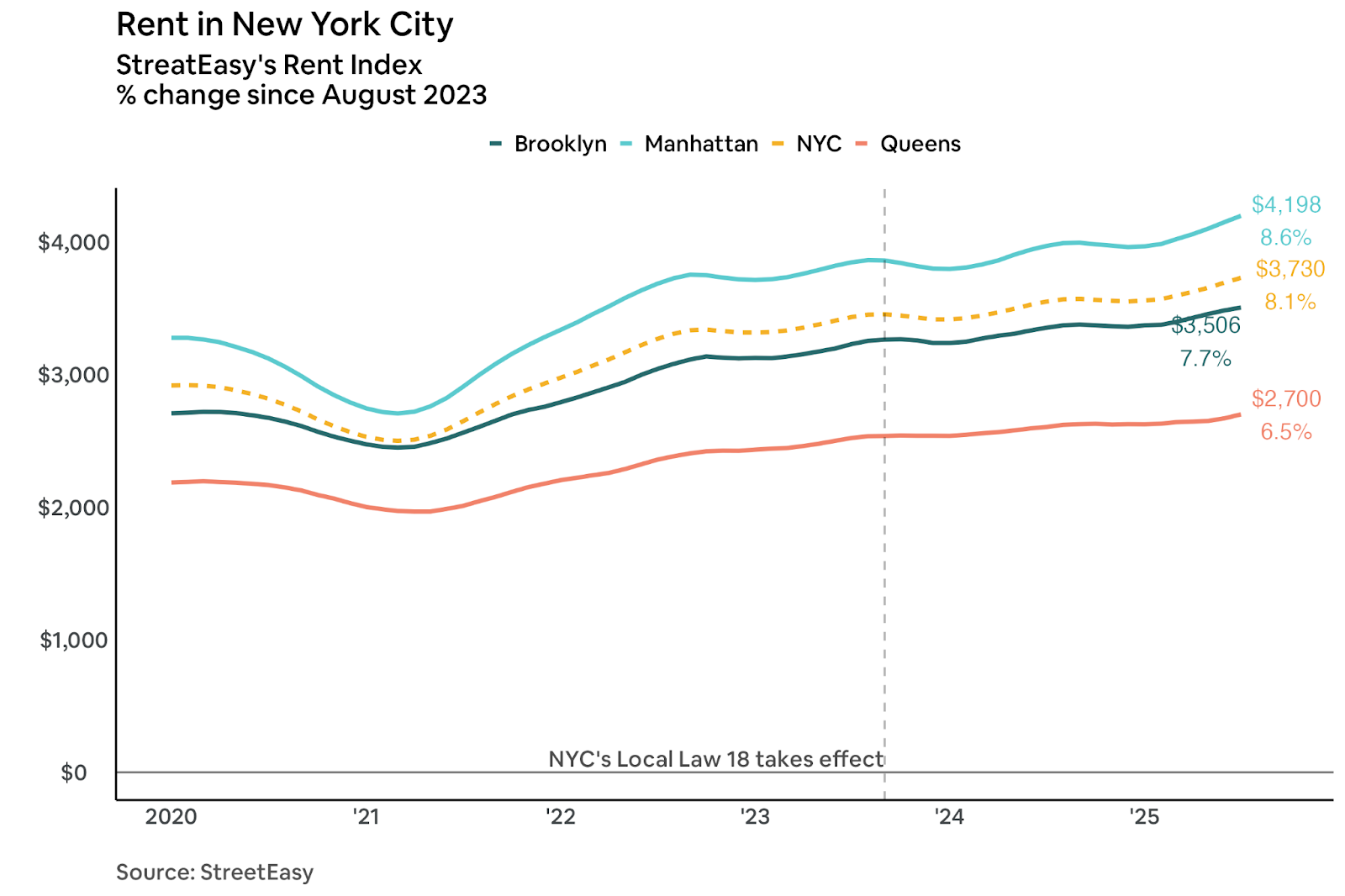
- Black and Latino households are leaving NYC as value of residing rises—The price of residing in New York Metropolis is now 74 percent higher than the nationwide common, with virtually 3 million New Yorkers paying greater than 30 % of their earnings on hire, placing them liable to homelessness. The pattern is worse amongst Black and Latino households who’ve left New York Metropolis at greater charges, demonstrating how town’s affordability disaster is disproportionately impacting communities of shade.
- Neighborhood companies have misplaced very important earnings from guests who as soon as spent roughly $800 per journey in native retailers and eating places however are more and more priced out of town resulting from lack of reasonably priced lodging choices.
- Small companies within the outer boroughs are going through reduced foot traffic and declining gross sales, an indication of weakening neighborhood economies. Citywide employment has decreased or remained stagnant, underscoring the pressure on small companies—town’s largest employers and a significant supply of native jobs.
Fewer guests and better prices
As communities throughout town are seeing their native economies hit laborious by a steep decline in tourism, New York Metropolis can be a far much less reasonably priced vacation spot after LL18 for low- and middle-income vacationers, particularly households with youngsters. Resort prices proceed to succeed in record-highs, up 12.6 % within the final two years—greater than triple the rise nationally—and households who as soon as relied on reasonably priced short-term leases are more and more priced out. Guests who wish to keep within the outer boroughs—usually to be near family members, drop off faculty college students, or stay close to a hospital for important care—now have few, if any, choices.
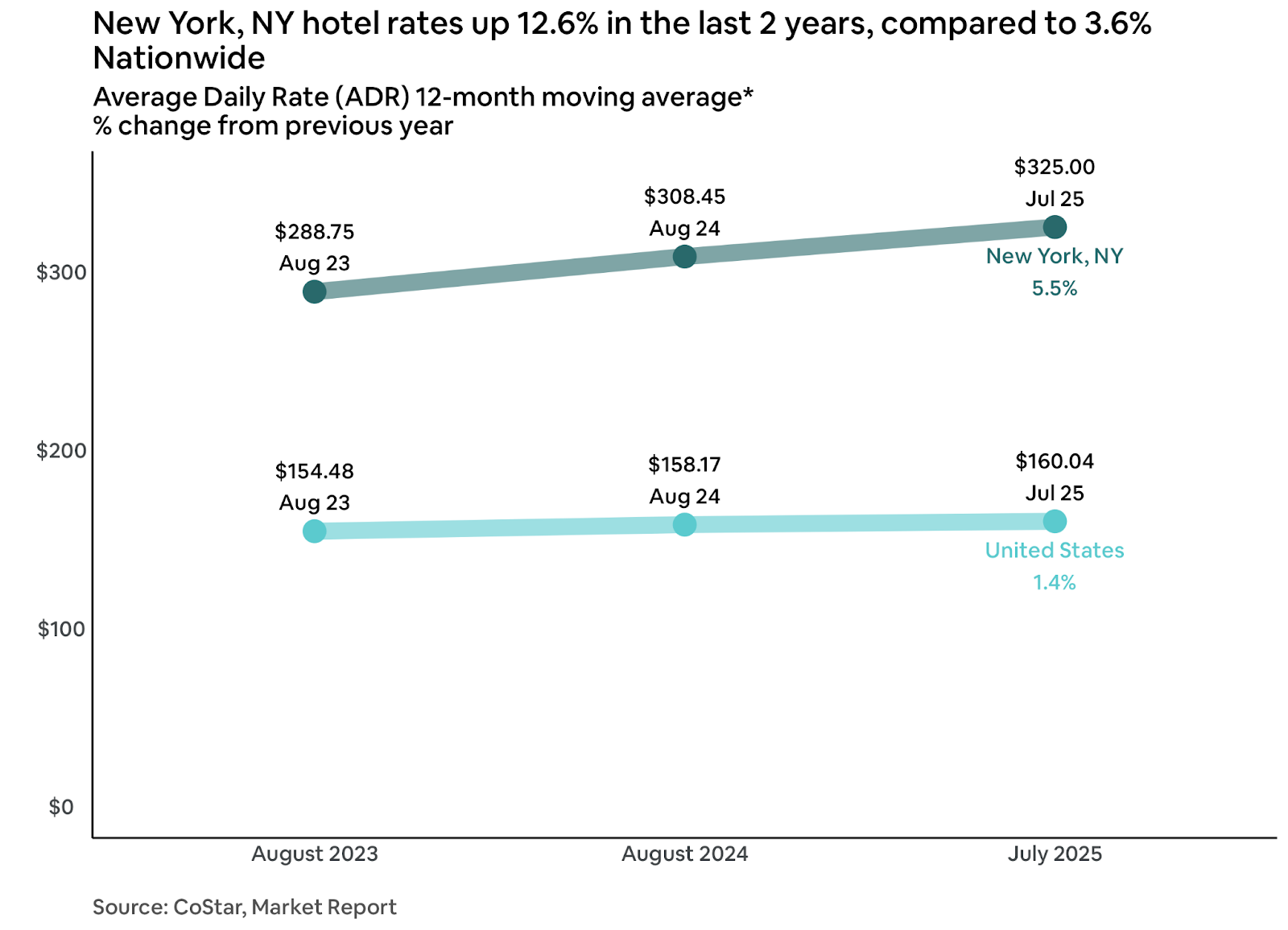
In consequence, journeys that when supported native retailers and eating places are both being reduce quick, pushed into midtown Manhattan’s high-priced resort market, or deserted altogether, leaving each guests and neighborhood companies worse off. Rising journey prices are possible an element contributing to NYC’s tourism bureau cutting its 2025 forecast for guests, together with 400,000 fewer home vacationers.
Rising momentum for common sense modifications with out taking away houses
Supporters of Intro. 1107 are urging the Metropolis Council to go modest reforms that may make a big distinction to the livelihoods of many of their communities, whereas serving to to return guests to town. Intro. 1107 would make three easy modifications:
- Permit New Yorkers in non-public houses to share them whereas away
- Enhance the visitor restrict from two to 4
- Allow using inside door locks so visitors and host can have elevated privateness
The invoice goals to place a reimbursement within the pockets of on a regular basis New Yorkers, serving to pay for payments and important dwelling repairs. The coalition backing the laws understands that Black and Latino households are on the best threat of displacement if the Metropolis Council doesn’t act, and helps these modifications to maintain households of their houses, maintain small companies, and be sure that the advantages of tourism are unfold equally throughout all 5 boroughs.
A broad homeowner-powered coalition
Coalition members have joined rallies, neighborhood conferences, and even an area door-knocking marketing campaign to share the tales of New Yorkers most impacted by the present guidelines. This homeowner-led advocacy displays the urgency of the second—with every passing month, extra households and small companies are feeling the affect on their pockets. Listed below are a few of their tales:
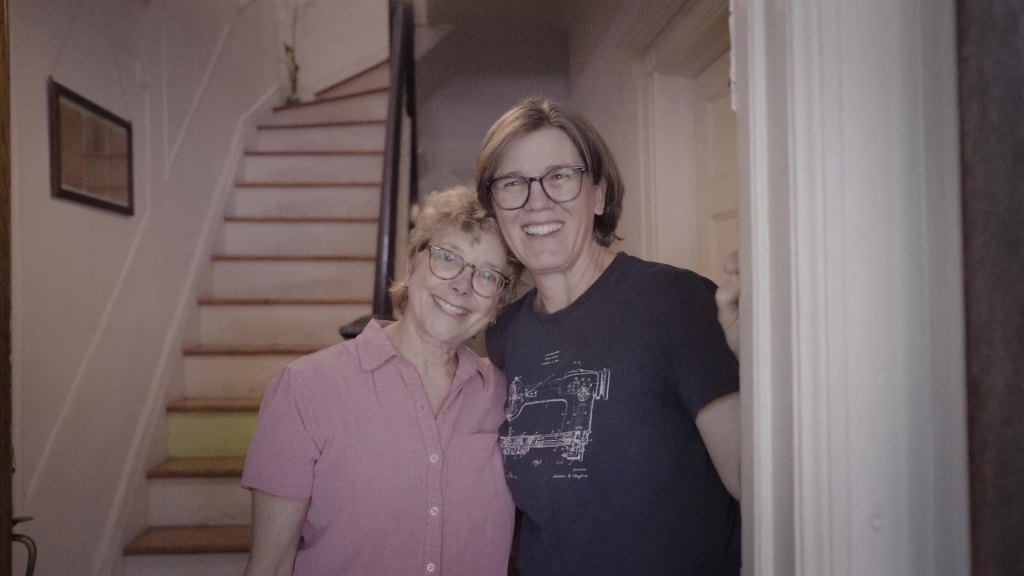
Lory and Cindy are proud householders in Prospect Lefferts Gardens. They turned to internet hosting to assist make ends meet and fund dwelling investments after many years of laborious work. After shedding very important earnings underneath Native Legislation 18, they’re talking out for Intro. 1107 so accountable {couples} like them can hold their houses, journey collectively, and proceed supporting their Brooklyn neighborhood.
Kerri is a home-owner in Jamaica, Queens who has relied on internet hosting for almost seven years to attain monetary stability and hold her household of their dwelling. Final month, she spoke out for truthful guidelines like Intro. 1107 so accountable hosts like her can proceed supporting their households and neighborhoods. (Credit score: Picture by Gabriele Holtermann, Brooklyn Paper.)
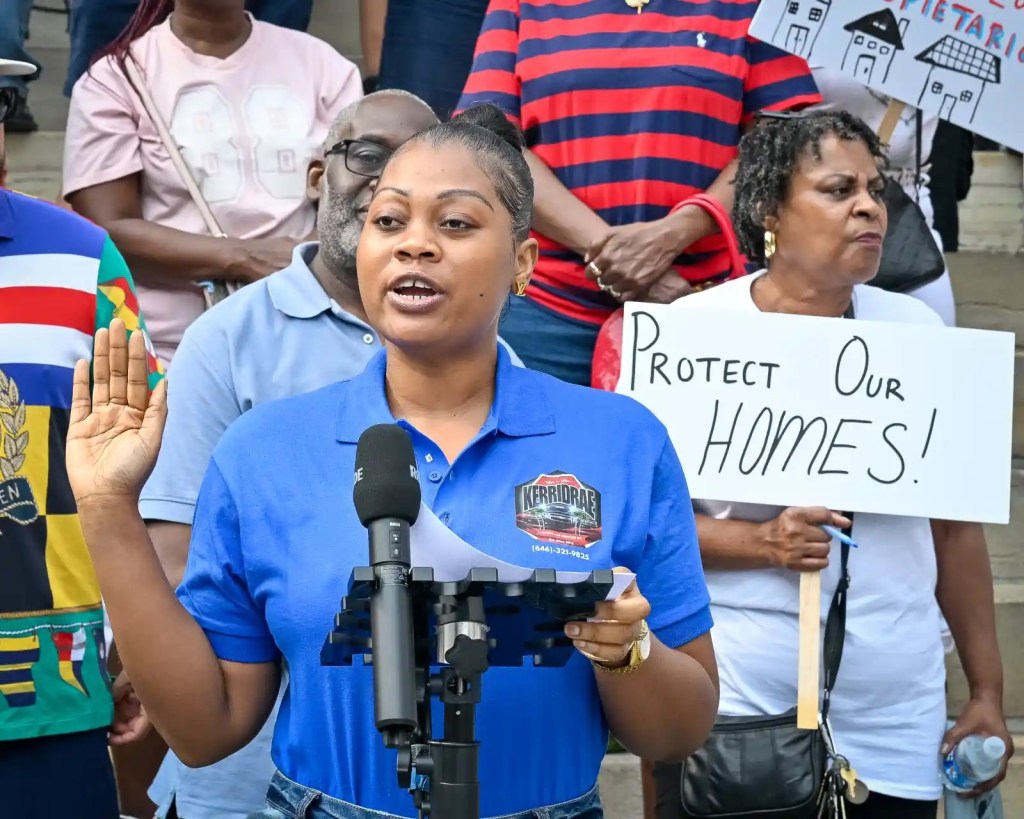
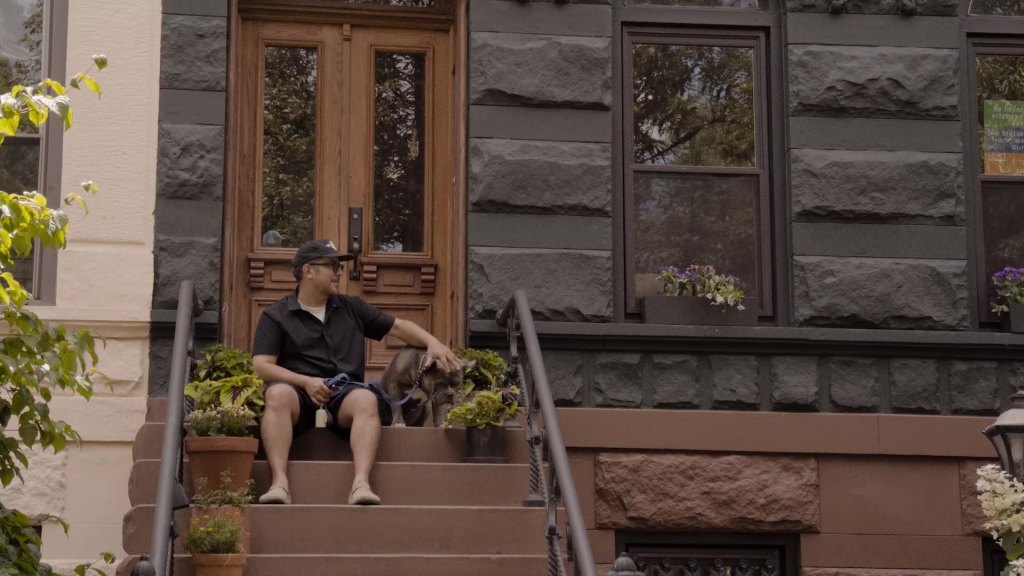
Jorge is a lifelong New Yorker and proud Bedford-Stuyvesant home-owner who turned to internet hosting to assist his household cowl their mortgage and climate challenges like layoffs. He’s advocating for Intro. 1107 so residents like him can hold their houses, help native retailers, and welcome guests to their neighborhoods.
The advocacy of those householders has captured the eye of civil rights, housing, good authorities, and enterprise leaders. The NAACP of Brooklyn and Jamaica, the New York Metropolis Housing Partnership, the New York City League, all 5 borough chambers of commerce, and over a dozen different organizations have joined householders to demand the Metropolis Council take motion. Their mixed voices symbolize a broad cross-section of New Yorkers and replicate a rising academic consensus that agrees that the present guidelines are failing to enhance the housing disaster, are hurting communities, and that focused reform is each pressing and mandatory.
“Brooklyn’s communities are united within the dedication to advancing homeownership and the broader pursuit of fairness and financial prosperity for individuals who have lengthy been marginalized. The various voices of Brooklyn—younger folks, elders, and multi-generational householders—underscore the pressing want for insurance policies that guarantee each resident can construct generational wealth and stability. Intro 1107 is a vital step towards equity, empowering householders to take care of financial resilience and stay rooted within the communities they’ve constructed. The invoice offers sensible protections, permitting main householders to hire responsibly with out sacrificing privateness or security, and helps be sure that the trail to prosperity stays open to all Brooklynites. The NAACP Brooklyn Department stands firmly within the battle for financial justice, recognizing that reasonably priced, steady housing is important to thriving neighborhoods, sturdy colleges, and unlocking the total potential of each neighborhood member. We look ahead to collaborating with our companions and coalition members to convene a roundtable with our Financial Growth Committee to heart a imaginative and prescient of homeownership rooted in fairness, justice, and alternative for all throughout Brooklyn.”
Joan Alexander-Bakiriddin, President of NAACP Brooklyn Department
“For too lengthy, communities of shade in Queens have carried a disproportionate burden of rising housing prices and shrinking stability. Homeownership is overwhelmingly how we construct generational wealth, but systemic boundaries proceed to lock too a lot of our neighbors out of that probability. Int 1107 is a vital step towards equity, defending Black householders’ skill to stay of their neighborhoods, and making certain that each household has the instruments they should face the broader affordability disaster, together with the selection to responsibly short-term hire their dwelling. The NAACP Jamaica Department understands that housing justice is inseparable from financial and racial justice. When householders can afford to remain, neighborhoods thrive, colleges strengthen, and households are in a position to plan for his or her futures. This invoice helps safeguard the promise of homeownership in Queens, and we’re proud to face with our neighbors and this broad coalition of advocates in urging swift passage to protect affordability, fairness, and neighborhood for generations to come back.”
Candace Prince-Modeste, President of NAACP Jamaica Department
“Overregulation is a serious contributor to the affordability disaster in New York Metropolis and the prohibition in opposition to main residents of 1-2 household homes from sharing their houses, once they’re away, is an instance that the Metropolis Council can act to treatment.”
Kathryn Wylde, President and CEO of Partnership for New York Metropolis
“Present short-term rental guidelines are hurting, not serving to on a regular basis folks. Within the midst of an affordability and housing disaster, neighborhoods like Bedford-Stuyvesant—the place short-term leases assist households and neighborhood companies keep afloat—are struggling probably the most. New York Metropolis’s householders ought to belief that town has their again throughout these economically difficult occasions. Intro 1107 presents a common sense answer that empowers struggling householders to earn additional earnings for payments and important repairs, all whereas safeguarding long-term housing.”
Jamie Smarr, President and CEO of the New York Metropolis Housing Partnership
“Present short-term rental guidelines disproportionately affect neighborhoods past Manhattan and marginalized communities. Now we have heard tales from our personal members who’re householders that may now not make their mortgage, small companies which can be seeing much less clients from out of city, and visiting family members who now not have a spot to remain close to their households. This legislation must be reformed to help New York households and our communities throughout all boroughs.”
Arva Rice, President and CEO of the New York City League
“The Metropolis’s strict laws on short-term leases have considerably affected native eating places within the outer boroughs and Higher Manhattan. With fewer short-term rental choices, guests are much less prone to discover these neighborhoods, impacting the native financial system. It might be useful for the Metropolis to rethink its present method to short-term rental regulation and discover a balanced answer that enables accountable householders to take part, serving to to help companies throughout all boroughs.”
Sandra Jaquez, President of the New York State Latino Restaurant, Bar & Lounge Affiliation
The rising momentum behind Intro. 1107 is obvious. New Yorkers can not afford one other yr underneath insurance policies that restrict earnings alternatives, kill jobs, and displace Black and Latino residents. The Metropolis Council should be sure that the advantages of tourism can proceed to be a lifeline for households constructing a future in our metropolis. Performing now will assist stabilize neighborhood economies and hold long-time residents of their houses. Each month with out reform means extra households pushed to the brink and extra low- and middle-income vacationers priced out of New York. The selection is easy: ship common sense reforms that work for all New Yorkers, or threat deepening a disaster that’s already harming the very neighborhoods town must be combating to guard.
Trending Merchandise











